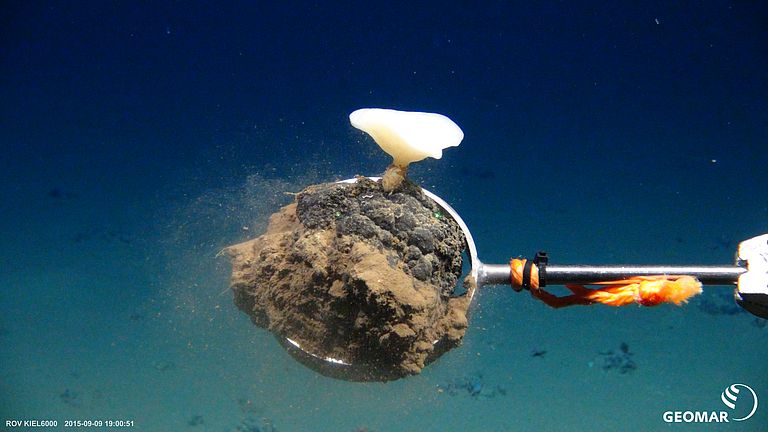29.09.2021 Lecture series WissenSchaffen (online lecture)
Dr. Matthias Haeckel: Environmental impacts of deep-sea mining
A significantly increased demand for critical metals is expected for our energy transition, mobility transition and digitalisation. These metals are also bound in mineral raw materials in the seafloor, such as manganese nodules in the deep-sea plains, massive sulphides on mid-ocean ridges and cobalt-rich crusts on submarine mountains. In the last 10 years, interest in these raw materials has therefore increased considerably. The International Seabed Authority, which manages the seabed outside the jurisdiction of states, has to date granted 31 licence areas for the exploration of these raw materials. However, it should also ensure the protection of the marine environment. In the European MiningImpact project, we are committed to appropriate environmental standards and guidelines by investigating the potential impacts of future deep-sea mining on the marine environment, developing and testing technologies and concepts for environmental monitoring, and defining threshold values and indicators to protect the deep-sea ecosystems.
In the online lecture "Environmental impacts of deep-sea mining", Dr Matthias Haeckel explains the environmental monitoring research during the first pilot mining test, which took place in spring 2021, and what the scientists have learned from it so far.
Time: Wednesday, 29 September 2021, from 10 to 11 a.m.
Location: https://geomar.webex.com/geomar-de/j.php?MTID=m9e973f378d5f5591ae15880ea0c2f2b6
Please note that the lecture is held in German.
Dr. Matthias Haeckel studied chemistry in Kiel and already worked at the former GEOMAR as part of his doctoral thesis. Afterwards, he moved to Dalhousie University, Halifax, Canada, for several years before he returned to Kiel in 2005 to work at the Leibniz Institute of Marine Sciences (IFM-GEOMAR). His research focuses on gas hydrate research and the ecological impacts of possible deep-sea mining.
The lecture is part of the public lecture series "WissenSchaffen", which presents ocean research in an easily understandable way. Interested parties are cordially invited to inform themselves about the work of GEOMAR at "WissenSchaffen".
Contact person:
Dr. Andreas Villwock (GEOMAR, Communication and Media), Tel.: 0431-600 2802, presse@geomar.de



